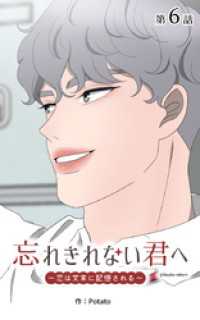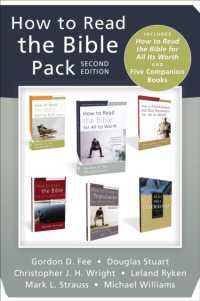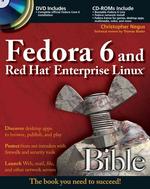- ホーム
- > 洋書
- > 英文書
- > History / World
Full Description
When reality becomes fantastic, what literary effects will render it credible or comprehensible? To respond meaningfully to the surreality of the Holocaust, writers must produce works of moral and emotional complexity. One way they have achieved this is through elements of fantasy.
Covering a range of theoretical perspectives, this collection of essays explores the use of fantastic story-telling in Holocaust literature and film. Writers such as Jane Yolen and Art Spiegelman are discussed, as well as the sci-fi television series V (1983), Stephen King's novella Apt Pupil (1982), Guillermo del Toro's Pan's Labyrinth (2006) and Martin Scorsese's dark thriller Shutter Island (2010).
Contents
Table of Contents
Acknowledgments viii
Foreword: The Rumpelstiltskin Factor (Jane Yolen)
Editors' Preface (Judith B. Kerman and John Edgar Browning)
Introduction: Fantasy as Testimony (Gary K. Wolfe)
Part I: Avenues of the Fantastic in Holocaust Literature
Uses of the Fantastic in Literature of the Holocaust (Judith B. Kerman)
The Fantastic in Holocaust Literature: Writing and Unwriting the Unbearable (Michael P. McCleary)
Surviving the Survivor: Art Spiegelman's Maus (Joan Gordon)
The Fantastic Search for Hitler: The Führer's Defense in His Own Words (Eric J. Sterling)
"Hidden in Plain Sight": On Holocaust Fantasy in the Metaphysical Detective Story (Patricia Merivale)
The Summons of Freedom: Fantastic History in Jonathan Safran Foer's Everything Is Illuminated (Paul Eisenstein)
Part II: The Holocaust and Fantasy Literature
The Last of the Just: Lifting Moloch to Heave (Jules Zanger)
The Door to Lilith's Cave: Memory and Imagination in Jane Yolen's Holocaust Novels (Ellen R. Weil)
Mother Goose Tales: Intergenerational Storytelling and the Holocaust in Jane Yolen's Briar Rose and Peter Rushforth's Kindergarten (Vandana Saxena)
The Devil's Arithmetic and Time Travel: Truth and Memory (Carol A. Senf)
Part III. (Re)Imagining the Holocaust Through Horror, Humor and Science Fiction
A Holocaust Education in Reverse: Stephen King's "The
Summer of Corruption: Apt Pupil" (Leon Stein)
Holocaust-as-Horror, Science Fiction and the "Look" of the "Real/Reel" in V (1983) (John Edgar Browning)
A Dishonest Reckoning: Play-"Acting Through" Personal Trauma and the Shoah in Martin Scorsese's Shutter Island (2010) (Kristopher Mecholsky)
Going Beyond Horror: Fantasy, Humor and the Holocaust (Caroline Joan (Kay) S. Picart)
Bibliography
About the Contributors
Index








